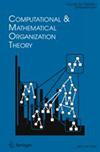Organized Immaturity in a Post-Kantian Perspective: Toward a critical theory of surveillance capitalism
IF 1.5
4区 管理学
Q3 COMPUTER SCIENCE, INTERDISCIPLINARY APPLICATIONS
Computational and Mathematical Organization Theory
Pub Date : 2023-07-01
DOI:10.1177/26317877231204083
引用次数: 0
Abstract
Organized immaturity has been defined as the erosion of the individual’s capacity for the public use of reason, pressured by control patterns of socio-technological systems built on obscure operating principles, ideologies, or regimes. Recent studies of surveillance capitalism explore the technological advancements of digitalization and analyse their negative impacts on information integrity and user autonomy. We identify organized immaturity as a deeper cause of these impacts and develop elements of a critical theory to explain the maturity-eroding effects of surveillance capitalism and to theorize an agenda for countermeasures. We first identify, describe and analyse infantilization, reductionism and totalization as emerging patterns of surveillance capitalism, which organize immaturity in human individuals and collectives. We then define the individual abilities and public deliberation principles needed to exercise maturity in private and public life, using Habermas’s theory of communicative action, as applied to human moral development, and Kant’s mentalist approach to individual maturity. Finally, we use these principles as a critical foundation and guide for citizens to nurture and protect individual maturity and democratic society from the infantilization, reductionism and totalization induced by surveillance capitalism.后康德视角下的有组织不成熟:对监视资本主义的批判理论
有组织的不成熟被定义为,在建立在模糊的操作原则、意识形态或政权基础上的社会技术系统的控制模式的压力下,个人公共运用理性的能力受到侵蚀。最近对监控资本主义的研究探索了数字化的技术进步,并分析了它们对信息完整性和用户自主权的负面影响。我们认为有组织的不成熟是这些影响的深层原因,并发展了一种批判理论的要素,以解释监督资本主义对成熟的侵蚀作用,并将对策议程理论化。我们首先识别、描述和分析了婴儿化、还原论和totalization作为监视资本主义的新兴模式,这些模式组织了人类个人和集体的不成熟。然后,我们定义了个人能力和公共审议原则,需要在私人和公共生活中行使成熟,使用哈贝马斯的交际行为理论,作为应用于人类道德发展,康德的心灵主义的个人成熟的方法。最后,我们将这些原则作为公民培育和保护个人成熟和民主社会免受监控资本主义导致的幼稚化、还原化和集权化的关键基础和指导。
本文章由计算机程序翻译,如有差异,请以英文原文为准。
求助全文
约1分钟内获得全文
求助全文
来源期刊

Computational and Mathematical Organization Theory
COMPUTER SCIENCE, INTERDISCIPLINARY APPLICATIONS-MATHEMATICS, INTERDISCIPLINARY APPLICATIONS
CiteScore
3.80
自引率
16.70%
发文量
14
审稿时长
>12 weeks
期刊介绍:
Computational and Mathematical Organization Theory provides an international forum for interdisciplinary research that combines computation, organizations and society. The goal is to advance the state of science in formal reasoning, analysis, and system building drawing on and encouraging advances in areas at the confluence of social networks, artificial intelligence, complexity, machine learning, sociology, business, political science, economics, and operations research. The papers in this journal will lead to the development of newtheories that explain and predict the behaviour of complex adaptive systems, new computational models and technologies that are responsible to society, business, policy, and law, new methods for integrating data, computational models, analysis and visualization techniques.
Various types of papers and underlying research are welcome. Papers presenting, validating, or applying models and/or computational techniques, new algorithms, dynamic metrics for networks and complex systems and papers comparing, contrasting and docking computational models are strongly encouraged. Both applied and theoretical work is strongly encouraged. The editors encourage theoretical research on fundamental principles of social behaviour such as coordination, cooperation, evolution, and destabilization. The editors encourage applied research representing actual organizational or policy problems that can be addressed using computational tools. Work related to fundamental concepts, corporate, military or intelligence issues are welcome.
 求助内容:
求助内容: 应助结果提醒方式:
应助结果提醒方式:


